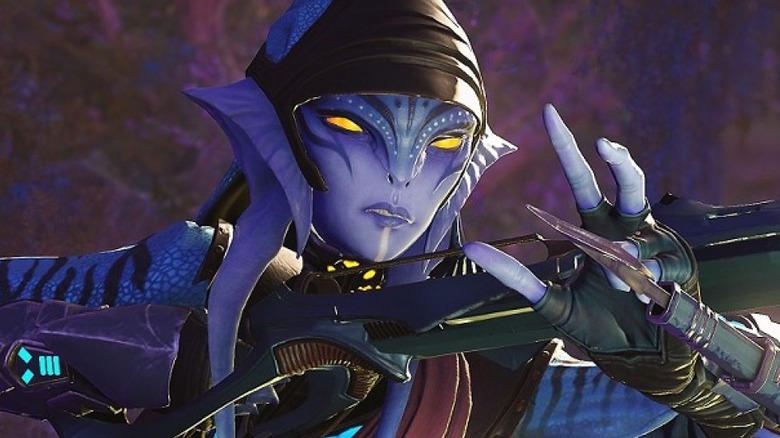The Truth About Amazon's New Fortnite Killer, Crucible
There has been a lot of talk recently about how Relentless Games and Amazon's Crucible could end up being a major competitor for Fortnite. This seems to be a conversation that springs up every time a new tactical shooter of any kind makes its big debut. After all, last year, we were pretty much expecting Apex Legends to dethrone Fortnite. Heck, it seemed as though Epic Games was equally afraid of Apex Legends besting Fortnite, considering Fortnite went through a ton of changes to compete with Apex Legends upon its arrival.
We've seen the same kind of talk surrounding Valorant, the new tactical shooter from Riot Games. A few months ago, notable streamer Pokimane theorized that Valorant could be the game to put the final nail in competing hero shooter Overwatch's coffin. Everyone has their eye out for the next big thing, so it's understandable that a high profile release like Crucible would receive the same kind of hyperbole and scrutiny. And there are plenty of reasons to be curious about what exactly Crucible has to bring to the table.
A recent interview with the creative team behind Crucible (via Eurogamer) illuminated many of the reasons why Crucible is being seen as a possible Fortnite killer. It appears as though that expectation was sort of baked into the game over the course of its production. In fact, Crucible began development as a very different game, but had to make some major changes in order to stand apart from the current gaming landscape.
The title began production as a third-person battle royale shooter with twelve players in each match. Each of these players would be on their own, with the matches operating on a "last man standing" basis. Whoever was still alive at the end of the match would be crowned the winner. However, there was another interesting wrinkle to the game: one player would act as a sort of "game master" who could manipulate the field of play and turn the tide of the battle. In this sense, that 13th player would operate similarly to the Mastermind characters in the newly-released Resident Evil: Resistance. It's an interesting concept to bring to a battle royale shooter game, but it ultimately didn't make it into the final game.
According to the game's creative director, Eric Flannum, the game was originally supposed to have a ton of features that took advantage of Amazon's ownership of Twitch. For example, Twitch viewers were supposed to be able to interact with the "game master" in certain ways. All of that changed as the game developed.
"You know, if you go back to the announcement we made in 2016 or so, the way the game was described, there were a lot more Twitch features in it, and it was much more designed to be a battle royale," said Flannum. "At the time, it was what we were shooting for. And then as we talked to streamers, as we played with our alphas, as we got feedback from all kinds of players, the game started to evolve."
That wording is very interesting, because it would seem that Flannum doesn't particularly view the game as it exists now as a battle royale. This is backed up by comments made to CNN by Relentless Games' Colin Johanson.
Johanson explained that the glut of battle royale games on the market let to Relentless' decision to consciously move further away from Crucible's battle royale roots. According to Johnson, the team "shifted away from [battle royale] a lot...I think Crucible is something entirely unique unto itself."
In fact, the portions of Crucible that could be considered a traditional battle royale are simply a part of many available game modes. There's a sort of raid mode where players will team up against giant bosses. There's also a mode similar to Fortnite's Duos and a few other objective-based gameplay modes. The game also allows players to level up and customize their character of choice in certain modes. In other words, Crucible is aiming to offer a little bit of something for every type of gamer.
In other words, Crucible isn't exactly the same as Fortnite, but that might be the leading factor in its favor. While it's unlikely to actually kill Fortnite, the game has a lot of potential to offer players looking for an alternative to Fortnite and other hero shooters like Overwatch.
There's also the fact that Crucible is only available for PC gamers. This means that it's unlikely to envelop as large of an audience as a title like Fortnite, which is widely available to all gamers. The mobile version of Fortnite alone is a smash success, recently surpassing $1 billion in revenue. Fortnite is likely here to stay, but Crucible appears to be a worthy rival for the folks who can play it.

